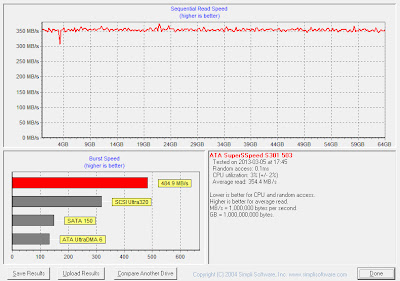So this review is a long time coming. It's been almost 3 months but finally I've had time to get everything in order and get some solid results.
Unfortunately I don't have the reliability of using the Intel RST drivers dedicated to a native Z77 motherboard so I'm using the non native RST that are currently being distributed to allow TRIM and RAID 0 on X79 boards. Therefore the results may be even better on a Z77 board. To give a better measurement of the type of performance we can see from this drive on various systems, I've utilised both the X79 Intel SATA III port as well as the LSI SAS 2308 port. Results of the Intel will be on top and LSI beneath:
HD Tune Pro
 There are 2 screens for each controller here. The first screen is the read performance followed by the write performance.
There are 2 screens for each controller here. The first screen is the read performance followed by the write performance. There was a weird anomaly with the LSI controller having a slow start that climbed almost immediately and stayed steady causing an average much lower than the sustained level of read and writes. LSI was performing a lot better across the board if not for that little hiccup.
There was a weird anomaly with the LSI controller having a slow start that climbed almost immediately and stayed steady causing an average much lower than the sustained level of read and writes. LSI was performing a lot better across the board if not for that little hiccup.HD Tach
The last test to wear the drives a little before formatting the drives for further benchmarks. Incredible burst speeds here. Well and truly above MLC levels.
AS SSD
ATTO Disk Bench
Anvil's Storage Utilities
There are 2 screens for each controller here. The first screen is the compressible performance followed by the incompressible performance.
CrystalDiskMark
Again here there are 2 screens for each controller. The first screen is the compressible performance followed by the incompressible performance.
Some very strong numbers again with the LSI controller when running incompressible tests. Still a peculiarity in the lower numbers of the 4K writes though. Overall another very strong performance from a 64GB drive.
PCMark Vantage
 |
| Intel |
 |
| LSI |
PCMark 7
 |
| Intel |
 |
| LSI |
Conclusion
From the results seen above, the 64GB edition of the SuperSSpeed S301 is no slouch when compared to the competition. Only the very best of the best (the 128GB version of the S301 included) will have a noticeable performance increase over this drive, and even then it would almost be negligible in day to day use. When I say the best of the best I'm also talking about 120-256GB capacity drives. It is a sequential writing beast and boasts great benchmark scores that put most larger capacity drives to shame. Being an SLC NAND flash drive makes it perfect for running in RAID setups that don't support TRIM either. Its in a class of its own as a small storage solution and I see it holding that crown for the foreseeable future.PS. Here's an 8 way RAID score for those who were wondering:
The slow start seems to be consistent with the HD Tune and HD Tach results and their initial low numbers before levelling out. It may also be responsible for the incredibly low 4K read and writes. Either way the sequential numbers are extraordinary and as a multimedia and games array it really does feel as good as it gets.
NOTE: I am in no way paid for this review and do not regularly review SSDs at a professional level. These are simply my results from personal testing without the strict procedures that other commercial tech review websites use. Therefore, please do not hold my results as a complete measure of what to expect if you purchase this drive, nor should you regard it as highly as results from trusted websites such as Real World Labs or Tweaktown.


















